
I started as an SEO expert. Still am, actually. But after years of working with WordPress, something shifted.
I found myself living in both worlds, understanding what Google wants and knowing how to deliver it through WordPress.
See, I’ve been through all the SEO evolutions. The keyword stuffing days, the Penguin and Panda updates that changed everything overnight.
Mobile-first indexing, Core Web Vitals, and now AI-generated content are challenging everything we thought we knew.
But here’s what interests me most: watching SEO tools evolve alongside these changes.
As someone who writes daily and optimizes content constantly, I’ve seen firsthand how the right on-page SEO tool can transform a struggling website into one that ranks.
The problem? Most small businesses waste money on tools they don’t need. Or worse, they skip on-page SEO entirely because it feels too technical.
Today, I’m ranking the best on-page SEO tools I’ve used over my 10 years in this space.
These aren’t tools I read about. These are plugins and platforms I’ve tested, implemented, and watched deliver actual results for small businesses trying to get found online.
On-page SEO matters more than most people think.
You can build all the backlinks you want, but if your titles are weak, your meta descriptions are generic, and your content is poorly structured, you’re fighting an uphill battle.
Let’s fix that.
Key Takeaways
What you’ll discover in this guide:
- How to test on-page SEO tools using criteria that actually matter for small businesses
- Which tools deliver professional on-page optimization without requiring technical knowledge
- The difference between WordPress plugins and external platforms for your workflow
- When free tools handle everything you need, versus when paid tools justify their cost
- How to avoid the biggest mistake: accumulating tools you never use while content sits unoptimized
- Smart ways to build an effective on-page SEO toolkit that grows with your business
How We Test On-Page SEO Tools
Testing SEO tools isn’t about opening them once and calling it done. I use these tools the way you would. On actual WordPress sites, with real content that needs to rank.
Here’s what I focus on when evaluating on-page SEO tools:
- Setup and Learning Curve: Can a small business owner get it running without calling a developer? I time how long it takes from installation to first optimized page.
- If it requires a manual thicker than a phone book, that’s a problem.
- On-Page Optimization Features: This is the core of the process. Does it help you write better titles and meta descriptions? Can it analyze your content and tell you what’s missing?
- I look for tools that actually guide you through fixing problems, not just pointing them out.
- Schema Markup Capabilities: Structured data intimidates most people. The best tools make adding schema as simple as filling out a form.
- I test how many schema types they support and whether you need coding knowledge to implement them.
- Content Analysis Accuracy: Some tools tell you to use your keyword 47 times. That’s not the correct SEO optimization approach. I compare tool recommendations against what actually ranks in Google.
- The good on-page tools understand semantic SEO and natural language.
- Real-Time Feedback Quality: Does it give you vague suggestions like “improve your SEO”? Or does it say “add your keyword to the first paragraph and create two more H2 headings”?
- Specific, actionable feedback wins every time.
- WordPress Integration: If it lives inside WordPress, it better not slow your site down. I check page load times before and after installation.
- Plus, does it work smoothly with top page builders and other plugins you’re already using?
These criteria focus on what actually helps small businesses rank better. Not vanity metrics, or features you’ll never touch. Just the stuff that moves the needle when you’re trying to get found on Google.
Why Trust IsItWP?
At IsItWP, we’ve been the WordPress community’s go-to resource since 2009, helping over 2 million users choose better SEO tools and plugins.
We test tools on real projects and provide ongoing SEO consultation to small businesses.
We don’t just install a plugin and write about it. Instead, we live with these tools for weeks, sometimes months. On top of that, we watch how they perform under pressure, after optimizing 50 pages at once, when your site traffic spikes, and when Google rolls out another algorithm update.
Our recommendations come from real experience. Not affiliate commission priorities or marketing hype.
Just honest assessments of what actually works for small businesses trying to rank better without hiring an SEO agency.
Best On-Page SEO Plugins for WordPress Sites
Now that you understand what I look for when looking for on-page SEO tools, let us look at them in detail. First, you can use the comparison table below to compare.
It tells you the SEO tool is best for, ease of use, best on-page seo features, and if a free version is available.
Plus, I have calculated all prices annually, regardless of how they are presented by the SEO company. This way, you can quickly compare.
| Tool | Best For | Key On-Page Features | Ease of Use | Free Version | Pricing |
|---|---|---|---|---|---|
| 🥇 All in One SEO | Small businesses wanting professional SEO | Content Scoring, Schema Markup, Auto Meta Tags | Very Easy | ✅ Yes | Start at $49.50/year |
| 🥈 Rank Math | Budget-conscious testing SEO tools | AI Content Help, SEO Checks, Unlimited Keywords | Easy | ✅ Yes | Starts at at $95.88/year |
| 🥉 Yoast SEO | Complete SEO beginners | Color-Coded Feedback, Readability Check, Meta Preview | Very Easy | ✅ Yes | Starts at $118.80/year |
| 4. SEOBoost | Small businesses on tight budgets | Content Scoring, Competitor Insights, Page Audits | Easy | ❌ No | Starts at $270/year |
| 5. Surfer SEO | Content-heavy strategies | Live Content Scoring, Topic Ideas, Auto-Fix | Moderate | ❌ No | Starts at $948/year |
| 6. SEMrush | Growing businesses needing multiple tools | Competitor Analysis, Site Checker, Writing Help | Moderate | ❌ No | Starts at $1,407.96/year |
| 7. Ahrefs | Data-driven content strategies | Site Checker, Browser Tool, Real-Time Alerts | Moderate | ❌ No | Starts at 1,548/year |
| 8. Clearscope | Businesses prioritizing content quality | Keyword Reports, A+ Grading, Page Monitor | Easy | ❌ No | Starts at 1,548/year |
| 9. Schema Pro | Non-technical business owners | Easy Schema Setup, Auto Data Pull, Set & Forget | Very Easy | ❌ No | Starts at $69/year |
Then, you can skip to any SEO tool on this list using the Table of Contents below.
- 1. All in One SEO (AIOSEO) ⭐⭐⭐⭐⭐
- 2. Rank Math ⭐⭐⭐⭐⭐
- 3. Yoast SEO ⭐⭐⭐⭐
- 4. SEOBoost ⭐⭐⭐⭐
- 5. Surfer SEO ⭐⭐⭐⭐
- 6. SEMrush ⭐⭐⭐⭐
- 7. Ahrefs ⭐⭐⭐⭐
- 8. Clearscope ⭐⭐⭐⭐
- 9. Schema Pro ⭐⭐⭐⭐
- Bonus Tools Worth Considering
- How to Choose an On-Page SEO Tool
- FAQs: About On-Page SEO Tools
- Final Verdict: Start Simple, Scale Smart
- Resource Center: Keep Improving Your WordPress SEO
With that said, let’s get into it.
1. All in One SEO (AIOSEO) ⭐⭐⭐⭐⭐
Enterprise features made simple | Best for: Small businesses wanting professional SEO without complexity
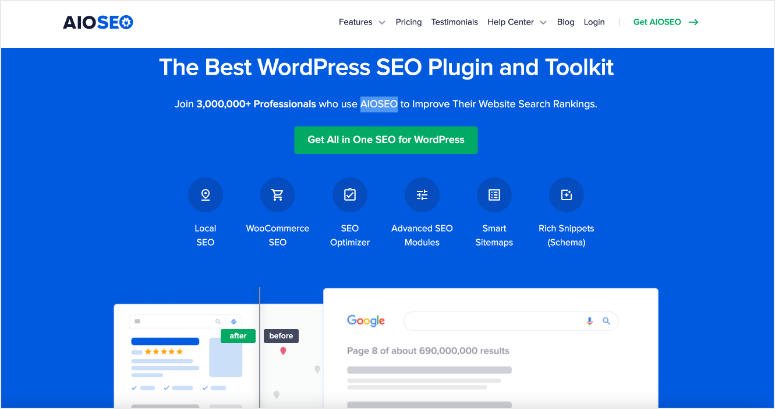
AIOSEO earned the top spot because it does something most SEO plugins struggle with. It makes advanced on-page optimization feel effortless.
This is my top recommendation after watching it transform how non-technical business owners approach on-page SEO.
For starters, the TruSEO Score Analysis is where AIOSEO really shines.
It evaluates your content across 70+ factors and gives you a simple checklist instead of overwhelming technical jargon.
You see things like “add your focus keyword to the first paragraph” or “increase your content to at least 600 words.”
It’s like having an SEO consultant looking over your shoulder, except you’re not paying $150 an hour.
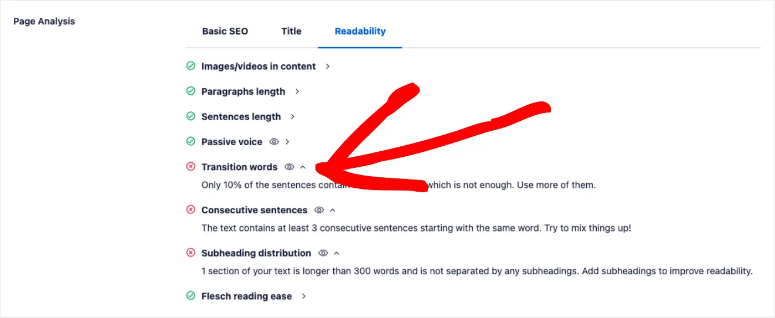
On top of that, the Schema Markup Generator removes all the intimidation from structured data.
You get 20+ schema types through simple dropdown menus. For example, a restaurant owner can add Local Business schema, complete with opening hours, location, and menu links in under 10 minutes.
No code. No confusion. Just click, fill, done.
This alone can boost your click-through rates through those enhanced search listings you see in Google.
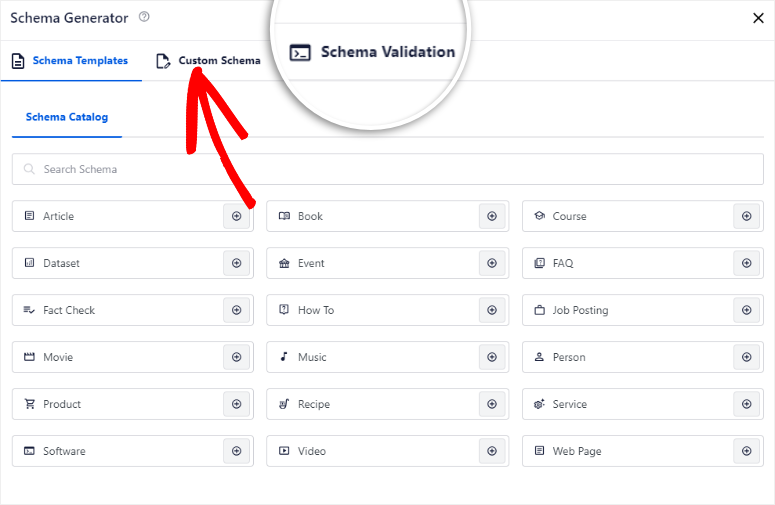
What impressed me most is how AIOSEO replaces multiple plugins.
The Smart Meta Title & Description Generator uses dynamic tags that automatically update things like copyright years without you touching them again.
The Link Assistant scans your content and suggests internal links, strengthening your site structure without manual analysis.
On top of that, you’re getting XML sitemaps, easily set up redirects, local SEO features, and internal linking automation in one clean package.
►Pros
- Free version rivals other plugins’ paid plans
- Content AI provides actual competitor insights, not generic tips
- Unlimited keywords without paying anything
- 18 schema types included at no cost
►Cons
- The 15+ modules can overwhelm beginners
- Advanced features need the pro version
My Verdict
AIOSEO delivers professional-grade on-page SEO without the professional learning curve. If you want powerful features that don’t require reading a manual, this is your plugin.
Check out my latest AIOSEO (All in One SEO) review here. You can also compare the free version and the pro version of AIOSEO to see which one works best for you.
Pricing: Free plugin available. Start at $49.50/year.
2. Rank Math ⭐⭐⭐⭐⭐
Generous free version with premium power | Best for: Budget-conscious businesses testing SEO tools
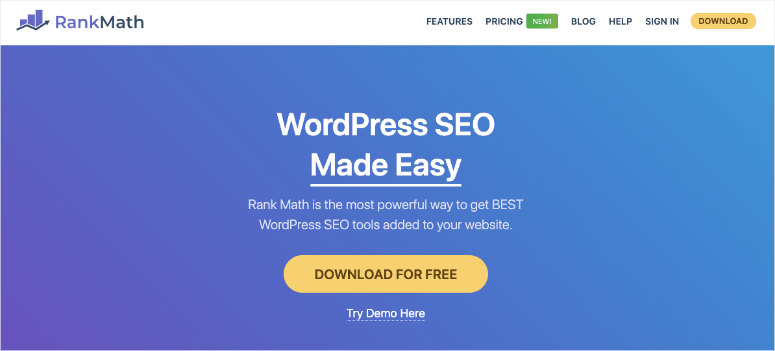
Rank Math sits at number two because it does something bold. It gives away features that other plugins charge hundreds for. This caught my attention immediately.
For example, you get unlimited focus keywords, 18 schema types, redirects, and 404 monitoring all in the free version.
But it is their Content AI feature that really grabbed my attention.
It scans top-performing content for your target keyword and tells you exactly what’s working for them. You see what topics they cover, what questions they answer, and what semantic keywords they use.
Then it suggests improvements for your content based on that data. It’s like having X-ray vision into why competitor pages rank higher than yours.
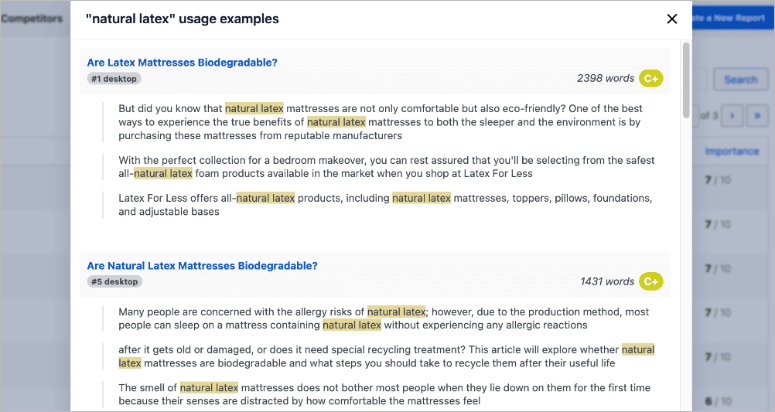
Apart from that, the SEO Analyzer runs 30+ checks with one click.
It examines your titles, meta descriptions, image alt text, internal linking structure, and content quality all at once.
So, instead of manually checking each element, you get a complete report showing exactly what needs fixing.
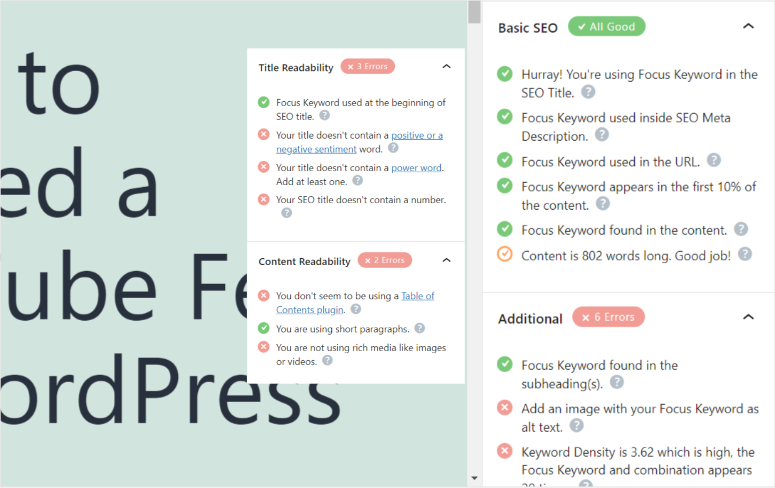
►Pros
- Free version rivals other plugins’ paid plans
- Content AI provides actual competitor insights, not generic tips
- Unlimited keywords without paying anything
- +18 schema types included at no cost
►Cons
- Setup can be complex for beginners
- Too many modules can be overwhelming
My Verdict
Rank Math rewards the time you invest in learning it. If budget is tight and you’re willing to watch a few tutorials, this gives you professional SEO capabilities for free.
To give you a better context of what the number one and number two plugins on this list offer, here is a comparison article on AIOSEO vs Rank Math.
Pricing: Free version available. Starts at $95.88/year.
3. Yoast SEO ⭐⭐⭐⭐
Market leader with beginner-friendly guidance | Best for: Complete SEO beginners

Yoast SEO remains the most recognized WordPress SEO plugin for good reason. It teaches while you optimize. This is what kept it in my top three despite newer competitors offering more features for less money.
The traffic light system makes on-page SEO decisions dead simple.
You see red, orange, or green dots next to each optimization factor. Red means “fix this now. “This often happens when your meta description is too short, or your keyword doesn’t appear in the first paragraph.
Orange means “could be better.” I see this a lot when content needs more internal links. Green means you’re good.
As a beginner, you can optimize a page without understanding SEO theory because Yoast gives visual feedback anyone can follow.
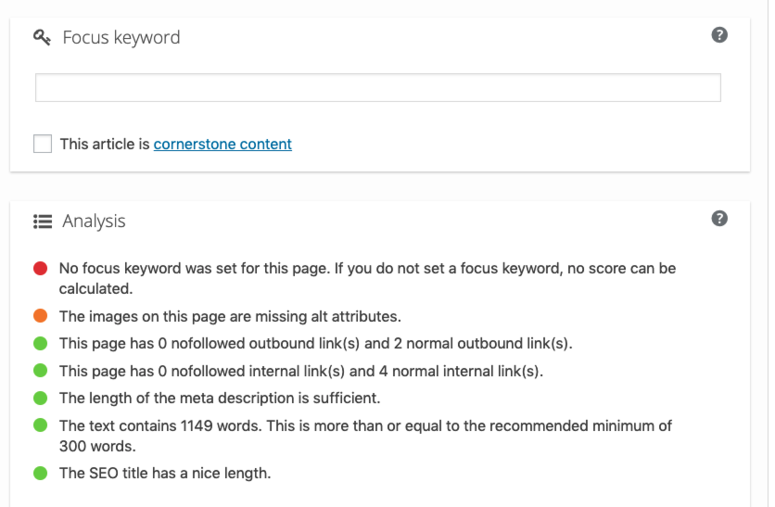
The Readability Analysis prevents the biggest mistake small businesses make.
It helps you write content that doesn’t sound like a robot. It flags long sentences, excessive passive voice, and paragraphs that drag on too long.
This matters because Google wants content that actually helps people, not keyword-stuffed nonsense.
With this simple tool, you can improve your content quality dramatically just by following these readability suggestions.
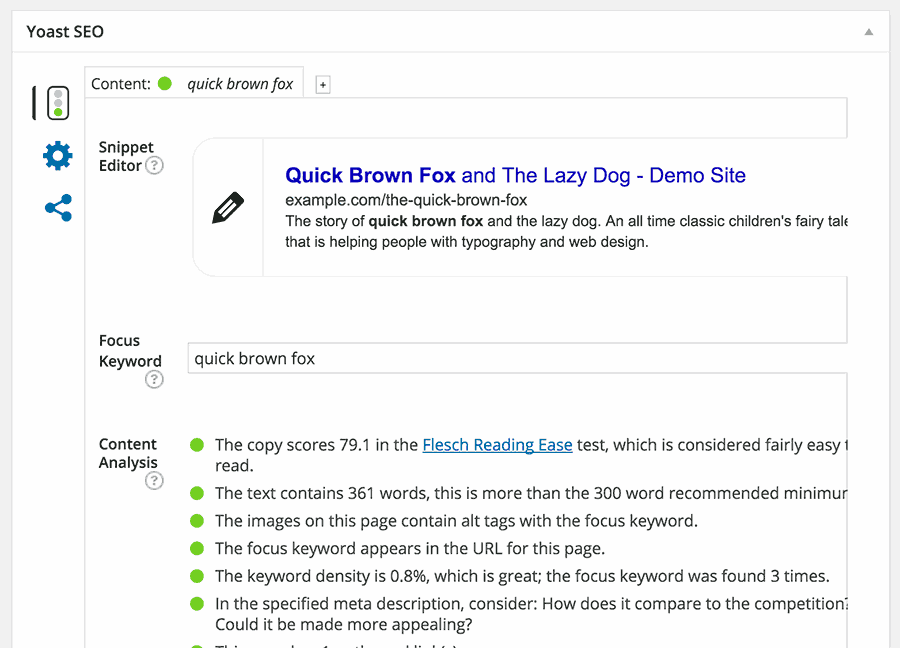
What Yoast does differently is education.
This SEO plugin explains why each factor matters, not just pointing out that it matters. When it suggests adding your keyword to the URL, it tells you why URLs influence rankings.
This turns users into better SEOs over time instead of just button-clickers following instructions.
►Pros
- Traffic light system removes SEO guesswork for beginners
- Readability analysis improves content quality naturally
- Educational approach teaches you SEO fundamentals
- Bundles Local, Video, News SEO for more value
►Cons
- A single focus keyword in the free version is restrictive
- Premium pricing is higher than Rank Math or AIOSEO
- The features are fewer than competitors at the same price point years
My Verdict
Yoast excels at making SEO easy for people who’ve never optimized anything. If you’re starting from zero knowledge and want a plugin that guides you through every step, Yoast delivers.
Check out my Yoast review for more details. You can also compare AIOSEO and Yoast SEO to see how the number one and number three SEO plugins on this list match up.
Pricing: Free version available. Starts at $118.80/year.
4. SEOBoost ⭐⭐⭐⭐
Affordable content optimization | Best for: Small businesses on tight budgets
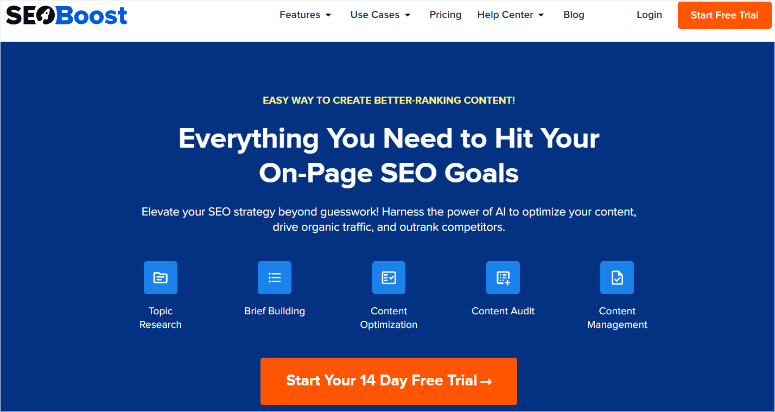
SEOBoost caught my attention because the AIOSEO team built it specifically to help small businesses with on-page SEO. You get enterprise-level content optimization without enterprise pricing.
The Real-Time Content Scoring works like Surfer but costs a fraction of the price (discussed next). As you write, it analyzes your content against top-ranking competitors and scores it instantly.
You see exactly what keywords to add, what topics to cover, and how your content stacks up.
The Content Audit Tool evaluates existing pages against current top-rankers.
It shows what’s outdated on your site and needs refreshing. This is critical for maintaining rankings as Google’s preferences evolve.
What sets it apart is the Content Campaigns system.
You can organize entire workflows from research through publication, assign tasks to freelancers, and track progress. This eliminates scattered Google Docs and endless email threads.
►Pros
Premium optimization at affordable rates
Content Campaigns organize complex workflows
Audit tool identifies outdated content automatically
►Cons
- Newer, so it has less brand recognition than competitors
- Since it is new, features are still evolving
My Verdict
SEOBoost delivers 80% of premium features at budget-friendly pricing. Perfect for small businesses ready to level up from free tools without breaking the bank.
Check out my updated SEOBoost review.
Pricing: Starts at $270/year.
5. Surfer SEO ⭐⭐⭐⭐
AI-powered content optimization | Best for: Content-heavy strategies
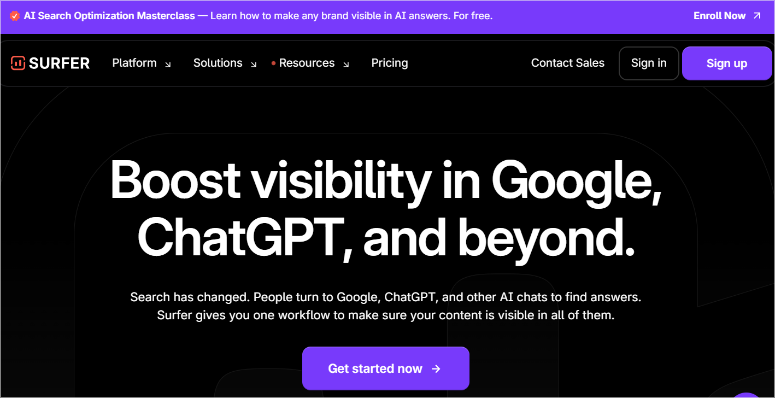
Surfer SEO lands at number four because it transforms content optimization from guesswork into data-driven decisions.
What caught my eye was how it analyzes 500+ ranking factors from top-performing pages and distills that into actionable steps.
The Content Editor scores your content 0-100 in real-time as you write.
You see immediate feedback: “add 6 more instances of this keyword,” “increase to 2,200 words,” “add 3 H2 headings.” No guessing what Google wants; Surfer SEO shows you based on what’s actually ranking.
The Topical Map feature visualizes content gaps across your site. It shows exactly what competitors write about that you’re missing, helping you build topic authority instead of random articles.
Apart from that, auto-Optimize delivers one-click improvements.
It automatically adds missing keywords and fills topical gaps in seconds. The Google Docs integration means you optimize where you already work, not in another platform.
►Pros
- Real-time scoring eliminates optimization guesswork
- Topical Map reveals exact content gaps
- Auto-Optimize saves hours of manual work
►Cons
- Monthly credit limits feel restrictive
- Expensive for small content volumes
- Can encourage over-optimization if followed too rigidly
My Verdict
Surfer SEO justifies its cost for businesses publishing 10+ optimized articles monthly. Occasional content creators will hit credit limits frustratingly fast.
Pricing: Starts at $948/year.
6. SEMrush ⭐⭐⭐⭐
All-in-one SEO platform | Best for: Growing businesses needing multiple tools
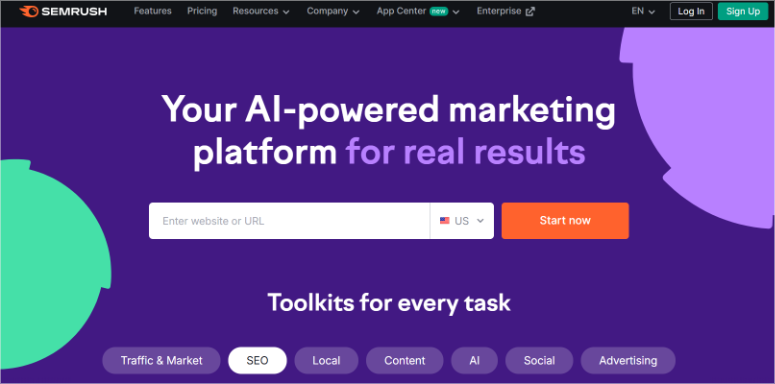
SEMrush earns this spot because it replaces five different tool subscriptions. I like how it brings everything into one dashboard without switching between platforms.
See, the On-Page SEO Checker analyzes your pages against the top 10 competitors in real-time.
It shows you exactly what’s working for them. For example, it shows you a better title structure, more internal links, and semantic keywords you’re missing.
Then it prioritizes recommendations so you know what to fix first.
The SEO Writing Assistant integrates into Google Docs and WordPress. You write, and it scores your content in real-time for SEO optimization and readability.
As a result, no jumping between platforms or copying content back and forth.
Then the Site Audit runs 170+ checks and color-codes issues. Red means fix now, yellow means later. With this, non-technical owners finally know what actually matters instead of staring at confusing technical reports.
►Pros
- Replaces multiple subscriptions in one platform
- Real-time competitor analysis guides decisions
- Color-coded priorities simplify technical issues
►Cons
- Credit limits feel restrictive for active use
- Steep learning curve with 55+ tools
- Premium features require the expensive Guru plan
My Verdict
SEMrush makes sense once your SEO budget hits $3,000 annually. Below that, focused tools deliver better value.
Pricing: Starts at $1,407.96/year.
7. Ahrefs ⭐⭐⭐⭐
Comprehensive SEO toolkit | Best for: Data-driven content strategies

Ahrefs makes this list because its data accuracy beats almost every competitor. I put it right next to SEMRush on this list because of how similar they are in the features they offer and what you can do with them.
You can actually compare the Ahrefs and SEMRush here to see what I mean.
First, it is an excellent Site Audit tool.
It checks 170+ technical and on-page factors, showing exactly what’s hurting your rankings. The Always-On Audit monitors your site 24/7 instead of weekly crawls.
So, when you get critical SEO issues, it triggers real-time alerts.
These issues include broken pages, missing meta descriptions, duplicate content, and more. This allows you to fix problems before they cost rankings.
Plus, it comes with an SEO Toolbar browser extension that delivers instant on-page analysis with one click. You’re researching competitors and boom!
Immediate insights on their title optimization, meta descriptions, heading structure, and keyword usage. No switching tools or copying URLs.
What impressed me most was the accuracy.
Ahrefs runs the second-most active web crawler after Google, so the data reflects reality better than tools relying on estimates.
With that said, the pricing is high, which can stop many small businesses from using it. Plus, it also works on a credit system, meaning this price can go even higher.
This is also the reason why it doesn’t rank higher on my list.
►Pros
- Most accurate data from massive crawl database
- Always-On Audit catches issues in real-time
- SEO Toolbar provides instant competitor insights
►Cons
High pricing barriers for small budgets
Complicated credit system confuses users
My Verdict
Ahrefs justifies its cost for businesses serious about data-driven SEO. Best for SEO agencies and large companies that need to make better data-driven decisions.
Pricing: Starts at 1,548/year.
8. Clearscope ⭐⭐⭐⭐
Quality-focused optimization | Best for: Businesses prioritizing content quality
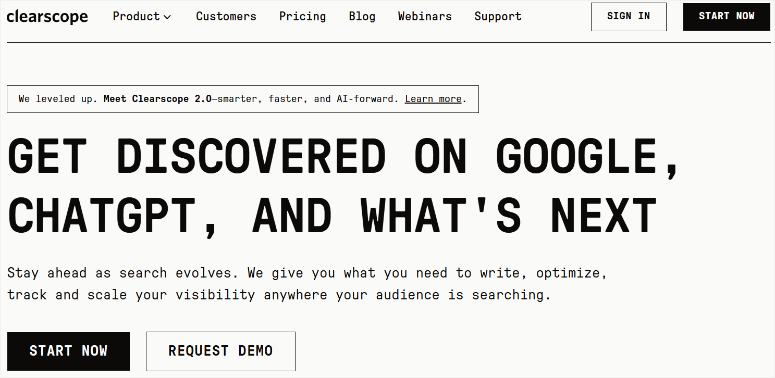
Clearscope lands at number eight because it prioritizes content quality over quantity. What caught my attention was how it simplifies optimization through a letter grading system anyone can understand.
The Content Reports analyze the top 30 ranking pages and provide semantic (relating) keyword recommendations. You see exactly which related terms competitors use and how often.
The letter grading scale (F to A++) removes guesswork—you know when your content is competitive.
On top of that, the Google Docs integration provides real-time sidebar suggestions while you write. No platform switching or copy-pasting content back and forth.
What sets Clearscope apart is Content Inventory Management.
It integrates with Google Search Console to identify pages losing rankings before traffic crashes. It also shows ranking opportunities. With this feature, you can see pages ranking positions 11-20 that need minor tweaks to hit page one.
►Pros
- Letter grading simplifies optimization decisions
- Content decay monitoring prevents traffic loss
- Top 30 page analysis provides comprehensive insights
►Cons
- Expensive with tight monthly limits
- No free trial before payment commitment
- Additional reports get pricey quickly
My Verdict
Clearscope works for businesses where content quality justifies premium pricing. High-volume publishers will find better value elsewhere.
Pricing: Starts at 1,548/year.
9. Schema Pro ⭐⭐⭐⭐
Best for: Non-technical business owners | Schema markup made simple
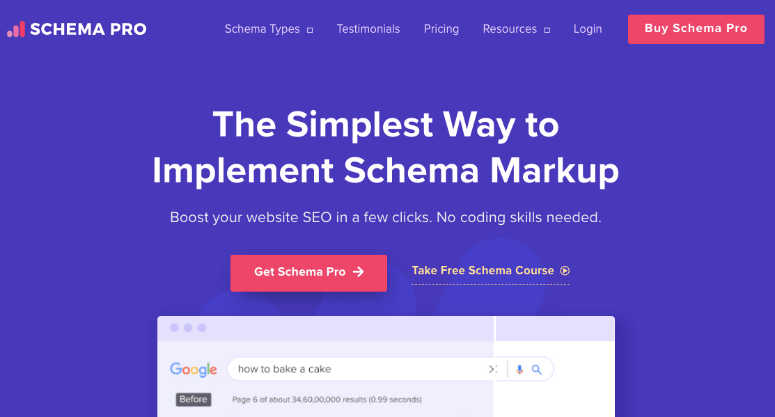
Schema Pro closes out the top nine because it solves the structured data problem that intimidates most business owners. I like how it turns complex code into simple dropdown menus.
The automatic field mapping pulls data straight from your WordPress content. Think titles, dates, authors, and featured images.
As a result, a restaurant can add Local Business schema showing opening hours, location, and menu information in under 10 minutes. Zero coding required.
Apart from that, this top schema plugin supports 20+ schema types.
This includes FAQs schemas, Product, Review, Recipe, and Event. eCommerce stores automatically add Product schema to all WooCommerce items, displaying prices and ratings in Google search results.
Rule-based automation sets the schema once and applies it forever. With this, configuring the Article schema for blog posts, and every future post gets proper markup automatically.
►Pros
- Makes structured data accessible without coding
- Automatic field mapping saves setup time
- Rule-based system maintains markup forever
►Cons
- Limited to schema markup only
- Must run alongside other SEO plugins
My Verdict
Schema Pro justifies its cost if structured data feels overwhelming. The lifetime license at $249 costs less than hiring a developer once.
Pricing: Free Schema-only plugin available. Starts at $69/year or $229 one-time lifetime license.
That’s it for my list of the best SEO tools with AI features. But, before we conclude the article, let us look at some bonus tools with great AI capabilities that go beyond on-page optimization.
Bonus Tools Worth Considering
These tools don’t focus exclusively on on-page SEO, but they support your optimization efforts in ways that make them worth mentioning.
MonsterInsights
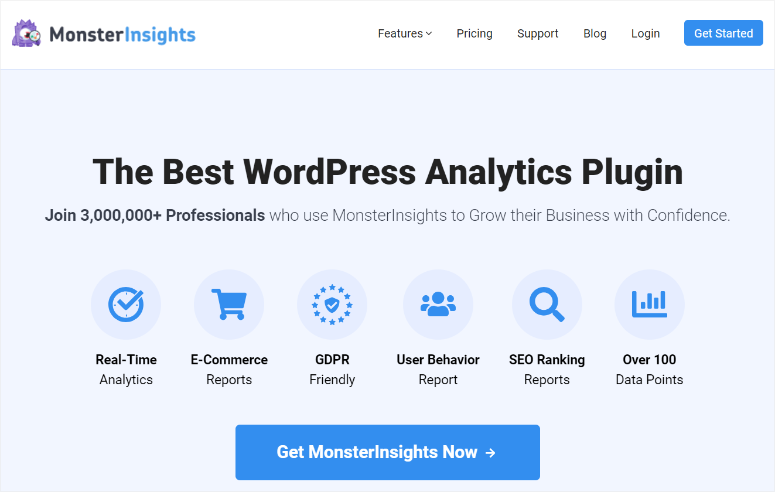
MonsterInsights bridges Google Analytics 4 and WordPress, translating complex data into actionable insights.
The Search Console Report displays your top-performing keywords, rankings, and click-through rate directly in your WordPress dashboard. So, no platform switching required.
The real value for on-page SEO?
You see which pages drive actual traffic and conversions. This tells you where to focus optimization efforts instead of guessing.
Plus, the Custom Dimensions Report reveals which blog categories and publication times work best, making your content strategy data-driven rather than random.
Who it’s for: Business owners who need analytics simplified and want SEO performance data inside WordPress.
Check out my MonsterInsights review for more details.
LowFruits
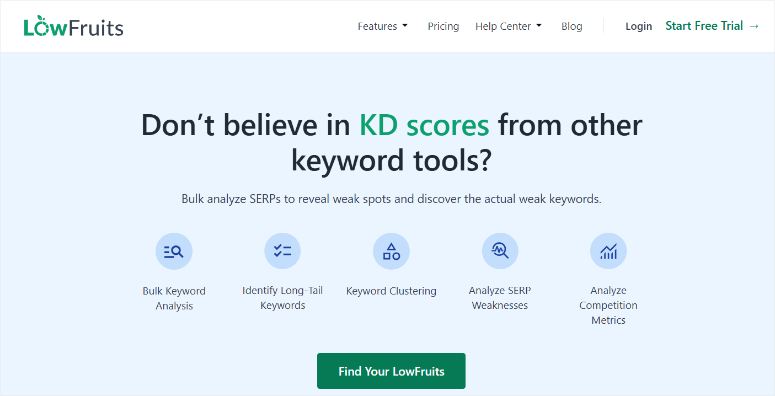
LowFruits specializes in finding low-competition keyword opportunities through “weak spots” analysis.
It identifies keywords where low-authority websites rank in top positions, showing you exactly which terms you can realistically target.
I like how the color-coded system makes opportunity assessment instant.
Green means low authority domains are ranking, so you have a shot. The Google Autosuggest integration discovers long-tail keywords competitors miss, perfect for targeting in your on-page optimization.
Who it’s for: Small businesses with low domain authority needing realistic keyword targets for their content.
Check out my LowFruits review for more details.
Google Search Console
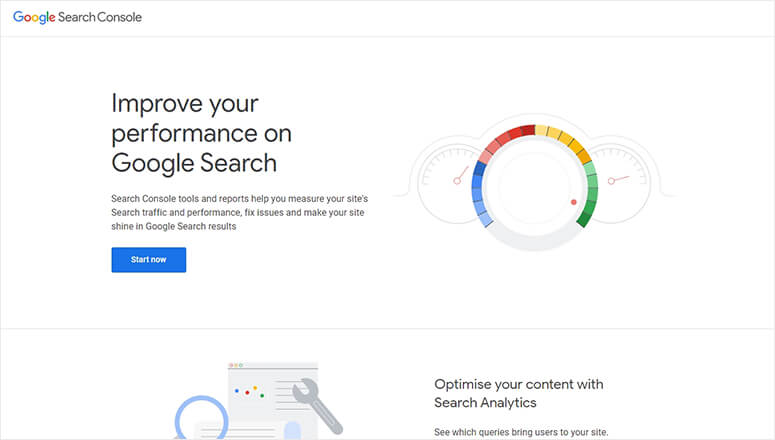
Google Search Console remains the non-negotiable foundation for any website doing SEO. It provides official Google data that no third-party tool can replicate.
The Performance Report tracks clicks, impressions, CTR, and rankings with 16 months of historical data.
On top of that, the Page Indexing Report ensures your optimized pages actually appear in search results.
This works well with the URL Inspection Tool that diagnoses individual page issues and requests indexing for new content. In the end, you get your pages visible in hours instead of weeks.
The highest-impact feature? Filter queries ranking positions 5-15 and optimize those pages to reach page one. This targets existing visibility rather than building from scratch.
Who it’s for: Every single website owner, regardless of budget or experience level. This is mandatory, not optional.
How to Choose an On-Page SEO Tool
Choosing the right on-page SEO tool isn’t about finding the one with the most features. It’s about matching the tool to your actual needs and skill level.
Start by honestly assessing your technical comfort.
- If you’ve never optimized a page before, AIOSEO‘s setup wizard is the best choice for you since it guides you step-by-step.
- Yoast‘s traffic light system is also a great option.
- If you’re comfortable with WordPress and want more control, Rank Math‘s free version offers advanced features without the beginner hand-holding.
Consider your primary on-page needs.
- Are you struggling with titles and meta descriptions? Any WordPress SEO plugin handles that. Need help with content optimization and keyword placement?
- Look at SEOBoost as my recommended option.
- Surfer SEO is also a great alternative.
- Want structured data without touching code? Schema Pro solves that specific problem.
Content volume matters more than people realize.
- Publishing 2-3 articles monthly? Free plugins like Rank Math handle that perfectly.
- Pushing out 10+ optimized pieces weekly? Content optimization platforms like AIOSEO justify their cost through time savings.
- Get started with an AIOSEO coupon for the best deals.
Budget reality check.
- Free tools have come incredibly far. Rank Math‘s free version includes features competitors charge $100+ annually for.
- Want a cheaper premium option with a wide range of features? Your best option is AIOSEO since the free version is also very powerful. This makes sense when you want to upgrade.
WordPress integration isn’t optional.
- Plugin-based solutions (AIOSEO, Rank Math, Yoast) live inside WordPress and optimize as you write.
- External platforms (Surfer SEO, Clearscope) require switching between tools and copying content.
- Plugins feel more natural for most WordPress users.
Avoid These Common Mistakes When Choosing an On-Page SEO Tool
- Don’t buy enterprise tools like SEMrush before mastering Google Search Console.
- Avoid choosing tools based on features you’ll never use.
- Don’t ignore Google Search Console. It’s free, essential, and provides data no paid tool can replicate.
- Always make sure you understand what SEO strategy you are implementing. Here is a guide on all the SEO basics, if in doubt.
- Don’t implement every recommendation the SEO tools offer. This goes back to my point above about understanding your SEO Strategy first.
- Don’t just fix your On-page SEO, as everything is interconnected. Check out this list of the best all-around SEO plugins.
That’s it from me! I hope you enjoyed learning about the best on-page SEO plugins. If anything is unclear, check out the commonly asked questions below.
FAQs: About On-Page SEO Tools
What’s the difference between on-page and off-page SEO tools?
On-page SEO tools help you optimize elements you control directly. This includes titles, meta descriptions, content quality, headings, images, and internal links. Off-page SEO tools focus on things outside your website, like backlinks, domain authority, and social signals. On-page tools improve what’s on your site, while off-page tools help with external reputation and link building.
Do I need multiple on-page SEO tools?
Most small businesses only need one WordPress SEO plugin (AIOSEO, Rank Math, or Yoast) as their foundation. Add specialized tools only when facing specific challenges. For example, Schema Pro if structured data feels overwhelming, or Surfer if you’re publishing 10+ articles monthly. Google Search Console is the only non-negotiable addition. More tools don’t equal better results.
Can free tools handle small business on-page SEO?
Absolutely. AIOSEO and Rank Math’s free versions include keyword optimization, 15+ schema types, and content analysis. Features often found on premium plans. Pair one of them with free Google Search Console, and you’ve got everything needed to rank well. Upgrade to paid versions only when you’ve maxed out free capabilities and know exactly what additional features you will add.
How long before I see results from on-page optimization?
Google typically needs 2-4 weeks to re-crawl and re-evaluate optimized pages. You might see ranking improvements within a month for less competitive keywords. More competitive terms take 3-6 months of consistent optimization. But I often see pages already ranking positions 5-15 jump to page one fastest, sometimes within days of optimization tweaks.
Should I use SEO WordPress plugins or external SEO platforms?
WordPress plugins (AIOSEO, Rank Math, Yoast) integrate directly into your writing workflow and optimize as you create content. External platforms (Surfer, Clearscope) require switching tools and copying content back and forth. For most WordPress users, plugins feel more natural and save time. Use external platforms only if you need the advanced content intelligence that their algorithms provide.
What’s the most important on-page SEO factor to optimize first?
Start with your title tags and meta descriptions. These appear directly in search results and influence both rankings and click-through rates. Next, focus on content quality. Here, ensure you’re actually answering what searchers want to know. Then tackle heading structure (H1, H2, H3), image alt text, and internal linking. Schema markup comes last but provides the biggest visual impact in search results.
Final Verdict: Start Simple, Scale Smart
The on-page SEO tool landscape in 2025 offers something I never had when I started. Powerful optimization features at prices small businesses can actually afford.
What I’ve learned after a decade in this space: the tool matters far less than consistent use. Free plugins now include features that cost thousands just years ago. Premium platforms deliver enterprise-grade insights at small business pricing.
Start with Google Search Console. It’s free and irreplaceable. Add one WordPress SEO plugin as your foundation. Master those two tools for 30 days before considering anything else.
The biggest mistake isn’t choosing the wrong tool. It’s accumulating subscriptions you barely use while your content sits unoptimized. Simple tools used weekly beat expensive platforms touched monthly.
Resource Center: Keep Improving Your WordPress SEO
On-page optimization is just one piece of your SEO strategy. To help you build a complete approach that drives real traffic and conversions, check out these related guides:
Enhance Your WordPress Foundation
- Best SEO-Optimized WordPress Themes – Start with a theme built for speed and rankings
- Best WordPress Sitemap Plugins – Help search engines discover and index your content faster
Expand Your SEO Toolkit
- Best WordPress AI Plugins – Automate content creation and optimization with AI
- Best WordPress Automation Plugins – Save time on repetitive SEO tasks
Specialized SEO Strategies
- Best SEO Tools for eCommerce – Optimize product pages and drive more sales
- 6 Best Local SEO Tactics Beyond Google Business Profiles – Dominate local search results in your area
These guides work hand-in-hand with the on-page tools we covered today. Start with solid on-page optimization, then expand into these areas as your site grows.
Each resource provides the same hands-on testing and honest recommendations you found here.

Thanks alot for this great informative vlog.